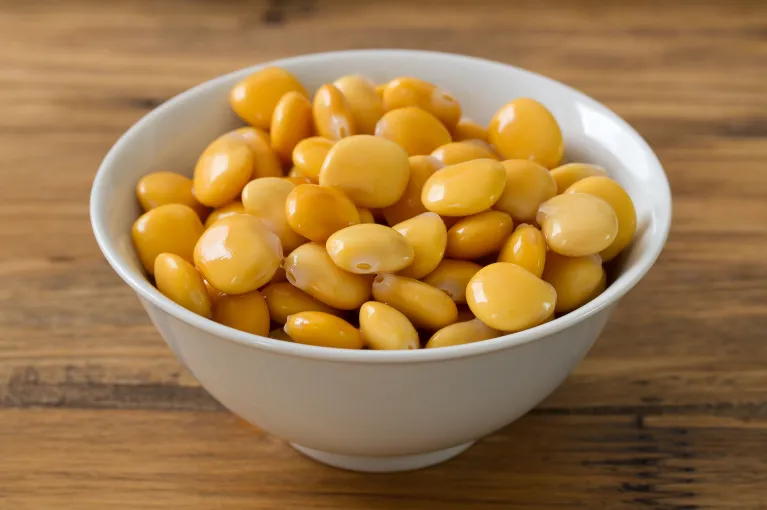

Minimum Order Quantity : 5 Metric Tonnes (MT) — as this is a higher-value dried/pulse commodity.
Packaging Types : 25 kg or 50 kg PP woven bags, jumbo bulk bags (1 MT), or container bulk.
Forms Available: Whole lupine beans (various colours: white, yellow, speckled) or splits/flour for some lines.
Shelf Life : 12–24 months (when stored in cool, dry, insect-free conditions)
Moisture Content : ≤ 12% (standard for export dried beans)
Purity : ≥ 98% (for human food grade)
Origin : Global: Australia, Europe (Mediterranean / Baltic), Latin America, North Africa (Egypt)
HS Code : 1209.99 (Other dried legumes) or 0713.90 depending on origin & processing.
Certifications : ISO 22000, ISO 9001, HACCP, GMP; Organic variants: USDA Organic / EU Organic; Phytosanitary & fumigation certificate.
Facilitated by Tradologie.com
This is a Vegetarian product.
Lupine beans are high-protein, high-fiber legumes increasingly used in human food (snacks, flour, baking), plant-based protein products, animal feed, and specialty health foods. Originating from regions like Australia, Europe (Germany, France, Spain) and Latin America, the global market for lupine beans is expanding thanks to consumer demand for plant-based nutrition, sustainable agriculture, and novel protein sources
Given this growing demand, bulk importers are seeking reliable sources of lupine beans worldwide — focusing on key attributes like purity (> 98 %), low moisture (≤12 %), uniform grade, proper packaging, and full export compliance including fumigation/phytosanitary certification. This creates opportunity for suppliers across global origins to meet large-scale import needs. On our platform, buyers looking to buy Lupine Beans in bulk, can gain access to verified bulk suppliers supplying container-loads of lupine beans with strong trade credentials.
| Variant | Grade / Attributes | Applications | Export Demand |
|---|---|---|---|
| Premium Whole Lupine Beans | Large size, uniform colour, minimal broken seeds | Gourmet snack beans, premium retail, plant-protein flour | High — Europe, North America |
| Standard Lupine Beans | Medium size, cleaned, good colour | Bulk food manufacturing, animal feed (dual-use) | Moderate |
| Organic / Non-GMO Lupine Beans | Certified organic, traceable, premium positioning | Health-food, vegan protein, specialty flour | Rapidly Growing |
Based on recent market data: the global export price for lupin seeds ranged in 2024 between US$1.35 to US$3.15 per kg.
Converted to per metric tonne this equates to a tentative lupine beans price per ton is US$1,350 to US$3,150 per MT FOB origin (depending on origin, grade, processing, certification and packaging).
Note: These are indicative figures. Final pricing will depend on origin, grade, shipping terms, certification, and order size. Contact verified suppliers for live quotes.
Lupine beans are increasingly valued across multiple food and industrial applications thanks to their nutritional profile, versatility, and sustainable crop credentials. Companies importing bulk lupine beans benefit from the ability to offer novel ingredients to markets including plant-based foods, health snacks and specialty flour products.
The global trade in lupine beans involves a full ecosystem of buyers and exporters. Through a verified B2B marketplace, importers worldwide connect with trusted lupine beans suppliers who adhere to food-safety, export-compliance and large-volume supply standards.
This full network ensures that through a platform like yours, buyers get access to verified suppliers capable of fulfilling large volumes, while exporters gain access to ready-to-buy global importers.
This content has been reviewed by Tradologie’s Agro Commodity Research Team.
Data References:
Get in Touch
Indicatively around US$1,350 to US$3,150 per metric tonne, depending on origin, grade, processing and certification (based on US$1.35-3.15/kg) from 2024 global data.
Typically 5 Metric Tonnes for this high-value legume commodity.
Ensure suppliers hold ISO 22000 / ISO 9001 / HACCP / GMP. For organic beans, check USDA Organic, EU Organic or equivalent. Also verify phytosanitary certificate, fumigation certificate, certificate of origin.
Major origins include Australia, Europe (Mediterranean countries, Baltic region), North Africa (Egypt) and Latin America.
Because importers get direct access to trusted exporters of high-quality lupine beans, transparent pricing, large-volume capability and full export-compliance — essential for food manufacturing, plant-based and retail use